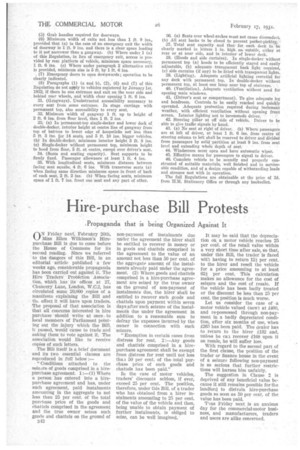Hire-purchase Bill Protests
Page 70

If you've noticed an error in this article please click here to report it so we can fix it.
,Propaganda that is being Organized Against It ON Friday next, February 20th, Miss Ellen Wilkinson's Hirepurchase Bill is due to come before the House of Commons for its second reading. Since we referred to the dangers of this Bill, in an editorial article published a• few weeks ago, considerable propaganda has been carried out against it. The Hire Traders' ' Protection • Association, which has its offices at 27, Chancery Lane, London, W.C.2, has circulated some 20,000 Copies of a manifesto explaining the Bill and tin, effect it will have upon traders. The proposal of that association is that all concerns interested in hire purchase should write at once to local members of Parliament pointing out the injury which the Bill, it passed, would cause to trade and asking them ti vote against it. The association would like to receive copies of such letters.
The Bill itself Is a brief document and its two essential clauses are reproduced in full' below:— " Conditions attached to the seizdre of goods comprised in a hirepurchase agreement. 1 :—(1) Where a person has entered 'into a hirepurchase agreement and has, under such agreement, paid instalments amounting in the aggregate to not less than 25 per cent, of the total purchase price of the goods and chattels comprised in the agreement and the true owner seizes such goods and chattels on the ground of 342
non-payment of instalments due under the agreement the hirer shall be entitled to recover in money or in goods and chattels comprised inthe agreement to the value of an amount not less than 50 per cent, of the aggregate amount of the instalments already paid under the agreement. (2) Where goods and chattels comprised in a hire-purchase agreement are seized by the true owner on the ground of non-payment of instalments due, the hirer shall be entitled to recover such gcods and chattels upon payment within seven days after such seizure of the instalments clue under the agreement in addition to a reasonable sum to defray the expenses incurred by the owner in connection with such seizure.
"Exemption in certain cases from distress for rent. 2 :—Any goods and chattels comprised in a hirepurchase agreement shall be exempt from distress for rent until not less thaa 50 per cent: of thetotal purchase price of such goods and chattels has been paid."
In the case of motor vehicles, traders' discounts seldom, if ever, exceed 25 per cent. The position, therefore, under this Bill, of a trader who has obtained from a hirer instalments amounting to 25 per cent. of the value of the vehicle and then, being unable to obtain payment of further instalments, is obliged to seize, can be well imagined. It may be said that the depreciation on a motor vehicle reaches 25 per cent. of the retail value within a very short time after sale, do that, under this Bill, the trader is faced with having to return 12i per cent. to the hirer and resell the vehicle for a price amounting to at least 62i per cent. This calculation makes no allowance for the cost of seizure and the cost of resale. If the vehicle has been badly treated or the discount be less than 25 per cent. the position is much worse.
Let us consider the case of a motor vehicle valued (new) at £400, and re-possessed through non-payment in a badly depreciated condition, after six months of use, when £265 has been paid. The dealer has to return to the hirer £132 and, unless he caa recover £168 upon it on resale, he will suffer loss.
With regard to the second part of the first clause, the position of the trader or finance house in the event of a seizure following non-payment is so serious that further restrictions will harass him unfairly.
The suggestion in Clause 2 is deprived of any beneficial value because it still remains possible for the landlord to distrain hire-purchase goods so soon as 50 per cent. of the value has been paid.
Trius Friday next is an anxious day for the commercial-motor business, and manufacturers, traders and users are alike concerned.






















































































































